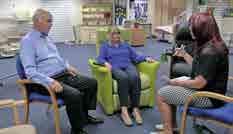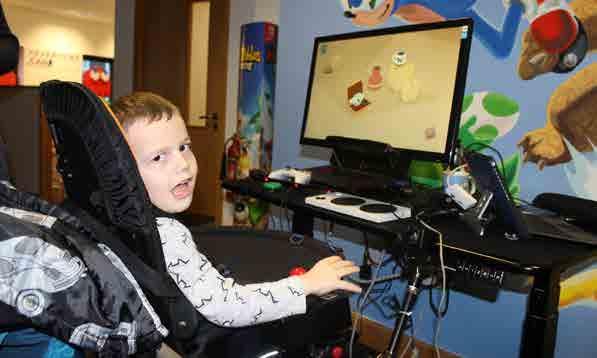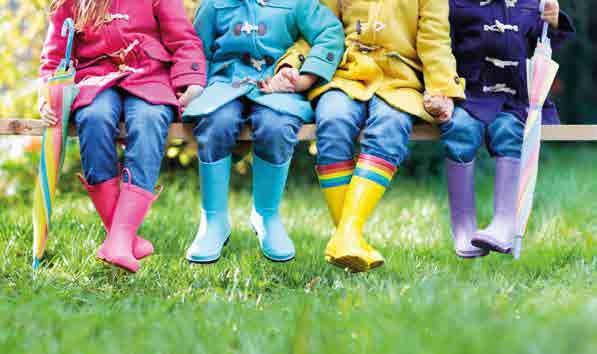
6 minute read
Mindfulness, parenting and additional needs
OLLIE BRAY IS A MINDFULNESS TEACHER AND WORKS FOR BREATHWORKS. IN THIS ARTICLE, OLLIE SHARES A SHORT MINDFULNESS PRACTICE FOR DIFFICULT EXPERIENCES
WHAT IS MINDFULNESS? “We suffer more in imagination
than reality” Seneca
Most of our suffering comes not from our circumstances, but our minds. Imagine two people stuck in the same traffic jam. One is getting increasingly frustrated that they aren’t moving, and worrying that they’ll be late, while the other is just enjoying the radio. Same situation, but very different experiences.
We have the primary experience of our situation, and then we have what we add to that, with thoughts, judgements, worries, self-criticism, and so on. Of course, sometimes even our primary experience can be very unpleasant; there can be pain, frustration, anxiety, and fear. But it’s possible to accept that primary suffering without adding fuel to the fire with this secondary mental suffering. This is easier said than done of course, because most of our secondary suffering is triggered automatically. This is where mindfulness comes in.
Mindfulness gives us the ability to notice our automatic thoughts, reactions, and judgements, which are so often harmful and unhelpful, and begin directing our minds in a more beneficial direction - perhaps one with less resistance, and more kindness to ourselves and others.
So, how does one learn mindfulness? As with any skill, mindfulness requires a little practice, but here’s a short exercise, called RAIN, that can get you started when you’re having a difficult experience:
Recognise the experience - recognise how you’re feeling in your body. Recognise how this experience is affecting you. Many of us live in a painful inner prison without being fully aware of it. Recognising what is actually happening moment to moment is the first step.
Allow the experience - usually when we feel discomfort, we either try to distract ourselves and numb out so we don’t have to feel that way, or we lose ourselves in the story that the difficult feelings are telling us, and
become overwhelmed. To allow the experience is just to let go of resistance, and just to be with the experience how it is. We can accept the feelings without accepting the judgement behind them.
Investigate with kindness - this means switching from a closed, contracted mind state to one of openness and curiosity. What’s going on here? You might ask the question “what am I believing?” In other words, what judgements am I introducing here? Do this with gentleness, kindness, and care for yourself. Everybody feels this way sometimes. You’re not alone; how would you respond to a loved one who feels this way? Non-identification. You are not your thoughts. You are not your pain. You are not your feelings of shame or distress. These experiences will arise, and they will pass away. You can allow yourself to feel those sensations fully without letting them define you.
Here’s a short account from a mindfulness teacher and mum on how mindfulness has helped her.
Iam not a very good advert for mindfulness and parenting. I don’t look the way the Facebook ads for mindfulness look; I eat big bags of Chilli Heatwave Doritos, binge watch
Netflix, and my house is not very tidy (we have a big bag of odd socks that we rummage through daily to find a pair. We call it the sock pile.)
Still, it is no exaggeration to say that the practice of mindfulness has transformed my life.
I want to share stories of shining pride about my daughters, one of whom has additional needs, but my girls are private souls, so I will try to say a little about why mindfulness has been a little bit of difficult magic in my life as a mum. I went on my first mindfulness retreat 13 years ago when I was 10 weeks pregnant with my eldest daughter. It was called One Moment at a Time, (run by Breathworks, who I went on to train with) and I still remember the grey sickness, tight band of headache, and how my mind whirled with all the first baby planning thoughts. I didn’t know then that she was different, but I already knew that I would do everything to keep her safe and prevent her suffering. In mindful movement workshops I lay on my back and wept- I had no idea how my body wanted to move, having lived largely from the neck up for most of my life. Pregnancy and mindfulness brought me back into relationship with my body, and I promised my unborn baby, rocked by my breath, that I would love her with my whole self. I began to come into a kinder relationship to my body – previously a vehicle for taking my brain to different locations where I often tried to fill it up with wine. In fact mindfulness helped me stop all that pre-baby - but that’s a whole other story.
My daughter broke my heart wide open, and mindfulness helped me keep it open. “The world breaks everyone and afterward many are strong at the broken places”.
So how is mindfulness a superpower? Well there is an intensity that parenting brings that I had not experienced before. I am very aware there are many families that have things very much harder than us. We are lucky. Still, I cannot help but notice that many families don’t see as many daily challenges as we do.
Being with my daughter’s suffering whilst being unable to align the world with her needs has brought feelings of grief and rage. Seeing statutory services fail her. Feeling misunderstood. Letting go of needing to be liked and becoming willing to be ‘that parent’. Becoming an advocate. Learning to honour my daughter’s autonomy. Noticing my wish to control. Noticing my aversion to her suffering.
All of this required that I learn to work with my mind - rather than against it.
Fundamentally, that’s what mindfulness is about: developing an awareness of how your mind works. Until I knew my mind, I couldn’t work with it - I was just fighting against it.
I learned to notice how one event - a certain kind of trigger - would create a cascade of thoughts like a nuclear reaction, leaving me stressed, tense, hurting. Once I noticed that, I also noticed that I had other options - I could respond, rather than react. I can relax my body, get curious about what I’m feeling and thinking, without getting caught up in that experience. It may sound like a small change, but the results were huge. It allowed me

to have better conversations with those in positions of authority. It allowed me to catch myself before I made things worse - for myself and those around me. It allowed me to be with my daughter in her pain without being overwhelmed. Both on and off the cushion, mindfulness has taught me to be with my mind, and be in my body.
And of course, sometimes I still get it all wrong, I make things worse, I say the swear word within ear shot, I get caught up in anxiety and fear for the future. I am a mess. Mindfulness teaches me to come back to the body and the breath, and see it’s never too late to meet myself, my daughters and those around them with kindness.







